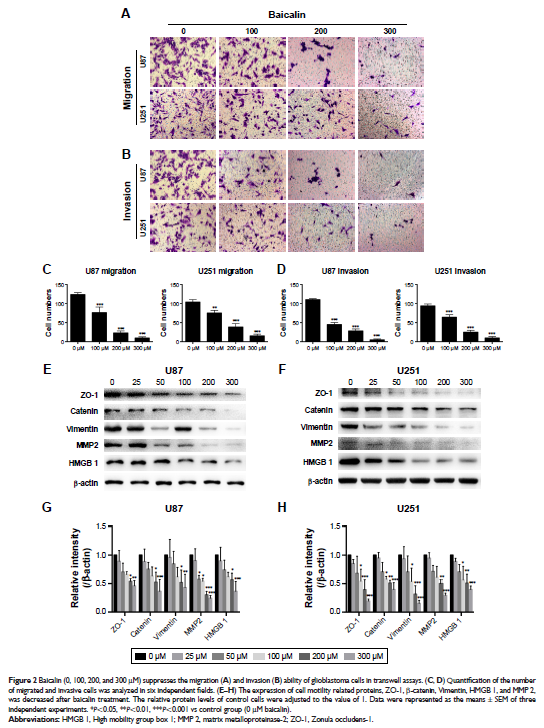108552
论文已发表
注册即可获取德孚的最新动态
IF 收录期刊
- 3.4 Breast Cancer (Dove Med Press)
- 3.2 Clin Epidemiol
- 2.6 Cancer Manag Res
- 2.9 Infect Drug Resist
- 3.7 Clin Interv Aging
- 5.1 Drug Des Dev Ther
- 3.1 Int J Chronic Obstr
- 6.6 Int J Nanomed
- 2.6 Int J Women's Health
- 2.9 Neuropsych Dis Treat
- 2.8 OncoTargets Ther
- 2.0 Patient Prefer Adher
- 2.2 Ther Clin Risk Manag
- 2.5 J Pain Res
- 3.0 Diabet Metab Synd Ob
- 3.2 Psychol Res Behav Ma
- 3.4 Nat Sci Sleep
- 1.8 Pharmgenomics Pers Med
- 2.0 Risk Manag Healthc Policy
- 4.1 J Inflamm Res
- 2.0 Int J Gen Med
- 3.4 J Hepatocell Carcinoma
- 3.0 J Asthma Allergy
- 2.2 Clin Cosmet Investig Dermatol
- 2.4 J Multidiscip Healthc

黄芩苷通过 Ca2+ 依赖途通路抑制人胶质母细胞瘤细胞的增殖、迁移和侵袭
Authors Zhu Y, Fang J, Wang H, Fei M, Tang T, Liu K, Niu W, Zhou Y
Received 8 June 2018
Accepted for publication 1 August 2018
Published 2 October 2018 Volume 2018:12 Pages 3247—3261
DOI https://doi.org/10.2147/DDDT.S176403
Checked for plagiarism Yes
Review by Single-blind
Peer reviewers approved by Dr Cristina Weinberg
Peer reviewer comments 2
Editor who approved publication: Professor Jianbo Sun
Objective: Baicalin, a kind of flavonoid extracted from the dry root of
Scutellaria, possesses potent anticancer bioactivities in various tumor cell
lines. Accumulating evidences show that baicalin induces autophagy and
apoptosis to suppress the cancer growth. Moreover, the antineoplastic role of
baicalin in human glioblastoma cells remains to be uncovered.
Methods: Both U87 and U251 human glioblastoma cell lines were employed in
the present study. Cell viability was tested by Cell Counting Kit-8 and
colony-forming assay; Flow cytometry was employed to analyze cell apoptosis,
cell cycle, and Ca2+ content. Cell immunofluorescence assays were used for analyzing
terminal deoxynucleotidyl transferase dUTP nick end labeling (TUNEL), light
chain 3 beta (LC3B),
5,5',6,6'-Tetrachloro-1,1',3,3'-tetraethyl-imidacarbocyanineiodide (JC-1), and
Ca2+ content. The
protein levels were tested by Western blot. The SPSS software was used for
statistical analysis.
Results: Baicalin suppressed the proliferation, migration, and invasion
ability of human glioblastoma cells in a dose-dependent manner. Baicalin
induced the loss of mitochondrial membrane potential and led to mitochondrial
apoptosis. The maturation of microtubule-associated protein 1A/1B-LC3B
indicated the activation of autophagy potentially through PI3K/Akt/mTOR
pathway, and inhibition of autophagy by 3-methyladenine decreased the apoptotic
cell ratio. Besides, baicalin increased the intercellular Ca2+ content; meanwhile, chelation of free Ca2+ by 1,2-bis(o-aminophenoxy)ethane-N,N,N',N'-tetraacetic acid
inhibited both apoptotic and autophagy. Finally, baicalin suppressed tumor
growth in vivo.
Conclusion: Our observations suggest that baicalin exerts cytotoxic effects on
human glioblastoma cells by the autophagy-related apoptosis through Ca2+ movement to the cytosol. Furthermore, baicalin has the potential
as a candidate for the treatment of glioblastoma.
Keywords: baicalin, glioblastoma, autophagy, mitochondrial apoptosis,
PI3K/Akt/mTOR pathway, Ca2+-dependent pathway
